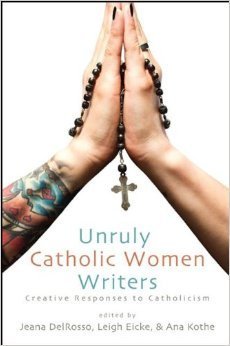Lacey Louwagie's Blog, page 22
October 21, 2013
It’s Here: The Nov/Dec Issue of Verily Magazine
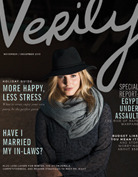 I’ve been waiting to write this post for a long time. The November/December issue of Verily Magazine is finally for sale, and it features my article, “Natural Wonder: Understand Your Cycle to Regain Your Sanity and Appreciate Your Body,” on page 87. In case the title doesn’t make it clear (and I think it does), the article is about the Fertility Awareness Method, focusing on the non-reproductive benefits, and how understanding it can give women tons of insight about their bodies.
I’ve been waiting to write this post for a long time. The November/December issue of Verily Magazine is finally for sale, and it features my article, “Natural Wonder: Understand Your Cycle to Regain Your Sanity and Appreciate Your Body,” on page 87. In case the title doesn’t make it clear (and I think it does), the article is about the Fertility Awareness Method, focusing on the non-reproductive benefits, and how understanding it can give women tons of insight about their bodies.
I’m thrilled about the article, and I’m also thrilled that Verily Magazine exists. Its tagline is: “Less of Who You Should Be: More of Who You Are.” While not as overtly feminist as magazines like Bust or Bitch, what it adds to the genre of women’s magazines is distinctly refreshing. The Nov/Dec issue includes articles about female bullying, an examination of dating “rules,” the effects of pornography on women, men, and relationships, and the prevalence of rape as a tactic of war. There’s some great advice about keeping your sanity in the sometimes-insane holiday season. It has some fashion spreads and tips, too — which feature real women instead of models. There are no ads and no airbrushing.
Its target audience is women ages 18-35, which is probably why so much of it resonated with me. It reminds me of the “grown-up” version of New Moon Girls, a magazine and web community for girls ages 8-14, which I’ve worked on in various capacities for 11 years. New Moon Girls is also ad- and airbrush free, featuring girls as they are and not as the world tells them they “should be.” Both publications would make great gifts for the girls and the women in your life this holiday season.


October 14, 2013
Rumpled ebook Cover – Your Opinions
I’ve been reading a lot about self-publishing ebooks lately as I slog through APE: Author, Publisher, Entrepreneur and Publishing e-Books for Dummies. A few months ago I made a “final” decision about the cover for my retelling of Rumplestiltskin, Rumpled, but I’ve been second-guessing myself and overthinking it. So I’ve decided to open it up to “crowd wisdom” with a vote on the following designs, all of which come from artist Krystl Louwagie.
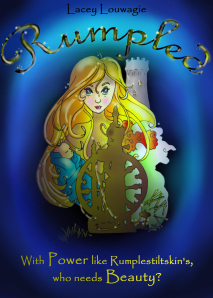
Cover 1
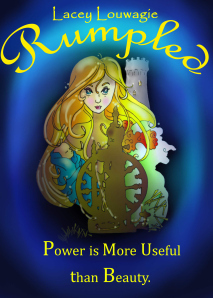
Cover 2
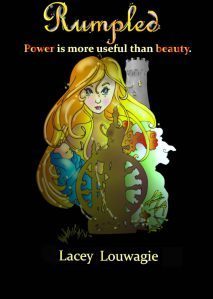
Cover 3
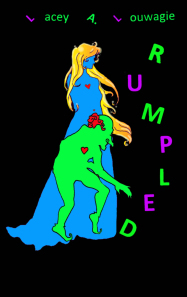
Cover 4
Some of the covers have different taglines than others; please disregard those and consider design elements only (color, font, illustration, etc.) when you vote. You can click on the images to see them bigger, but it’s important that the cover look good in small scale, since ebook covers are often displayed as thumbnails.
Take Our Poll


October 8, 2013
A Prayer for Vocations
My latest post is up on Young Adult Catholics, which is a reflection of gratitude on the many ways people creatively answer their vocations despite obstacles.


October 7, 2013
Booklikes: My New Website Crush
Book blogs have been around for as long as the Internet has been, and WordPress alone probably has hundreds of them. But now there’s a website created for the sole purpose of hosting book blogs, making it super easy to connect books to your entries, with templates for book reviews and quotes from books ready to go. Perhaps that doesn’t sound all that much more special than just inserting images and links to any old blog, but there’s something magical about a blogging site that’s all books, all the time. I think I’m a little bit in love.
The website is BookLikes, and it’s got an interesting story. Initially, its main attraction was its book recommendation engine. Then it crashed, losing all its data … but rather than throw in the towel, its creators listened to what the initial users were saying, which was that they wanted a site devoted to book blogs. So BookLikes was born anew, and I found and fell in love with it in its current state.
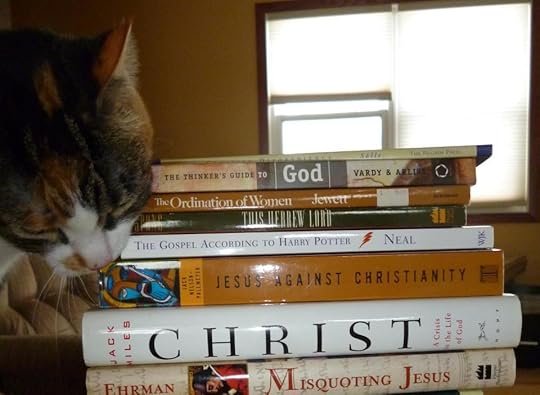
My kitty loves books, too!
I’m already an avid user of a couple other book websites. I post reviews of everything I read on Goodreads, and I inventory the books I own at LibraryThing. You can use BookLikes to inventory and review books, too, and in fact, I do cross post my Goodreads reviews there (as well as some of the posts from this blog, when they relate explicitly to books.) But it’s also provided a place for me to reflect more intimately on the books I’m reading, to share thoughts in progress or to connect books to my own life and memories in a way that I don’t in more straightforward reviews. I don’t think anyone much reads them, but that’s okay. I find the process of creating alone to be cathartic and rewarding.
So, if you haven’t checked it out, do stop by. And if you’re already a Booklikes convert, let’s “follow” each other. Hope to see you there!


October 4, 2013
A Year in the Life, Week 24: This is a Story About …
Although I’ve been keeping up with my Year in the Life journaling, the last two exercises, which I wrote while on my trip to Puerto Rico, were not especially inspiring. Now that I’m home, today’s exercise helped me crystallize the experience in Puerto Rico. I find I often can’t or don’t write about trips while I’m on them. I know people who hardly ever write except to keep “trip journals,” who need something to shake them up a little to inspire them to write. While I’m traveling, I’m too immersed and overwhelmed by the experience itself to write about it — but that doesn’t bother me anymore, because now I know that the memories and meanings will continue to surface for the rest of my life in “ordinary time,” and that there will be many more opportunities to write about it, from a place that understands more.
This week’s prompt was to begin (and to repeat) your writing with the words, “This is a story about …” So, without further ado, my story about Puerto Rico.
This is a story about an airplane shaking over an ocean, and not knowing what I would find when it landed. It’s about the white-haired cabby who picked us up but conversed very little, and the way seeing Walgreen’s comforted me. It’s about my misgivings when I saw balconies and windows enclosed with iron bars, and how soon I was so used to it that it meant very little.
This is a story about driving around Ponce for hours looking for non-existent laundromats, and finally finding one manned by a teenager in Arecibo. It’s about saving chicken from Burger King to give to a frightened stray dog, and leaving our hotel room ate night hoping to find the resident cat. It’s about Church doors wide open, and how you were hesitant to go inside. This is a story about a world that smelled strange — fish and seaweed and garbage and sand and sun. It’s about huge metallic structures I never did understand, and some that I kind of did. It’s about being with you 24/7, and how hard being apart again was when we returned. It’s about fights while washing laundry in the sink, and the anger that propelled me all the way up to the Arecibo Observatory.

Arecibo Observatory, the largest radio telescope in the world.
This is a story about the beauty and terror of unexpected, narrow mountain roads, and the queasy mix of
sadness and relief when it was over. It’s about people who buried their chiefs two thousand years ago, and the hurricane that revealed them. It’s about getting lost on public transportation, eating too much Mofongo, watching too much reality TV and Juno three times in one day. It’s about not remembering my Spanish until the very end.
It’s about the way I held your hand during the explosions in Iron Man, and how we cried watching a movie with English subtitles. It’s about how we couldn’t spend all our arcade tokens in time, and how I came home with a folder full of tickets and itineraries I can’t bring myself to throw away.


October 1, 2013
Unruly Catholic Women Writers are Here!
A book of women’s reflections on Catholicism that I contributed to is now available for sale through SUNY Press and Amazon. Don’t let the hardcover price alarm you — it’s available in paperback and ebook formats, too! You can download the flyer with more information here.


September 30, 2013
Imagination and the Preservation of Culture
I didn’t get a chance to blog last week because I was on vacation in Puerto Rico with my husband, with only one laptop (his) between us. When I’m on vacation, I prefer to be as fully “present” as possible, so I didn’t ask for access to the laptop for much more than researching where we would stay and what we would see the next day.
Despite distancing myself from the Internet, traveling always gives me the itch to write. It makes me see the world in new ways. It takes me away from all the day-to-day demands on my time and my mind. It challenges me to dream.
In Puerto Rico, we visited two sites of particular historical significance. One was the Castillos de San Christobel and de San Felipe de Morrow, fortresses that were built to guard San Juan as early as the 1500s and used for military defense all the way up until the 1960s. The other was the the Indian Ceremonial Center at TIbes, where artifacts from ancient times were first discovered after a hurricane washed away the soil covering them in 1975.
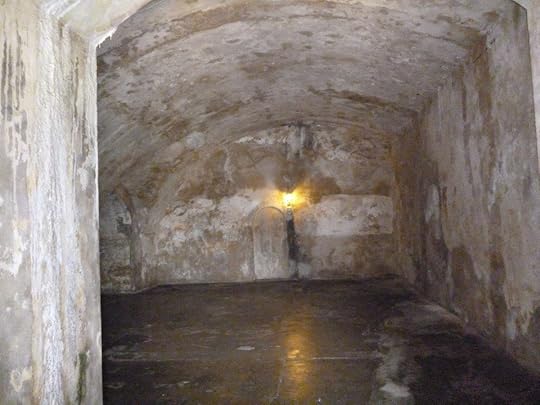
Entering San Christobel’s tunnels
As we explored these places, I found myself grateful that humans, as a species, can agree that our past is important to preserve, examine, and continue to discover. Undoubtedly large amounts of money and labor have gone into preserving the significant places that remain, and a cynic might ask what the purpose is. We can, after all, learn about history through reading; why is it important to keep these places intact, when they might be used for businesses to turn a profit and create jobs, or to feed families?
The cliche, and obvious, answer is that by learning about our heritage and our past, we can continue to evolve as a species and make better decisions about our present and our future. But there’s something else there, too. These places continue to intrigue us because we have the ability to imagine. Because they help take our minds deeper into themselves than we might be able to go on our own. We each have only one life to live (the possibility of reincarnation aside), and yet, by reading and exploring new places and new times, we can have the opportunity, just for a few moments, to taste what another life might have been like. And this, somehow, makes our own lives more meaningful, reminds us that we are not alone as the tapestry of history continues to unfurl.
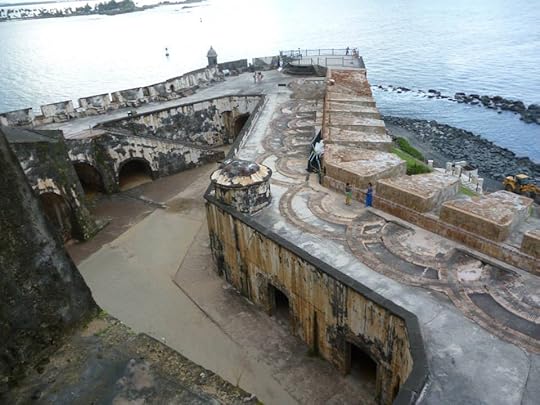
The view from atop San Felipe de Morrow.
Many of the plaques in the castles invited visitors to “imagine” what it might have been like for soldiers marching through the tunnels from one end of the castle to another, or to look out on the ocean and see an enemy ship approaching. A group of tourists (possibly drunk) stood at a lookout point on the sixth floor of San Felipe and yelled, “The British are coming!”, as if they were children immersing themselves in imagination at the playground. At the Ceremonial Center, my favorite part was listening to the guide explain, in detail, the ceremony indigenous people participated in when one of their chiefs died. Part of the ceremony involved getting the chief’s favorite spouse incredibly drunk, so she or he could, at the end of it all, be buried with the chief and go to the next world with him or her. The guide said, “They got her drunk to be merciful, so she wouldn’t be frightened when they buried her; and because it made their jobs easier, and she wouldn’t struggle. These people were primitive, but they were not stupid.”
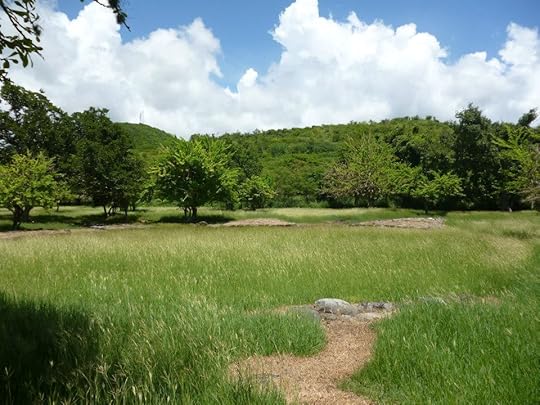
An ancient “calendar” formation — the triangles uncovered represent the points of the sun, with 12 of them in the complete circle.
And for a few moments, standing on the edge of rock formations that had the same sort of significance to the tribes of Puerto Rico that Stonehenge held for the ancient peoples of the UK, I could live what they lived.
This ability to imagine ourselves in other lives is one of the greatest gifts of humanity. It imposes on us the importance of preserving Stonehenge, the Castillos in Old San Juan, and the pyramids in Egypt and Mexico. More importantly, in opens up our capacity for compassion, as our hearts ache over those who were killed in the Holocaust, or beat faster with fear when we imagine an enemy ship on the horizon. As writers, we probably spend more time in the realms of imagination than most people do. But visiting places from the past that have been lovingly preserved reminds us that we are not alone in our desire to understand and to create more and more. Instead, we are part of a vast network of scientists, historians, curators, librarians, travelers, and others who are dedicated to preserving and exploring what it means to be human–we are in good company, indeed.


September 17, 2013
To Outline or Not to Outline: A Question Only You Can Answer
 A few weeks ago, as I fretted over my Dark Crystal submission (which I still haven’t started), one commenter authoritatively told me I must write an outline for it. I did, and I am, because it’s such unfamiliar territory for me that I just feel a lot safer going in with a map. But that’s not always the decision I make.
A few weeks ago, as I fretted over my Dark Crystal submission (which I still haven’t started), one commenter authoritatively told me I must write an outline for it. I did, and I am, because it’s such unfamiliar territory for me that I just feel a lot safer going in with a map. But that’s not always the decision I make.
Currently, I’m reading APE: Author, Publisher, Entrepreneur, which recommends outlines and disses authors who don’t use them handily in one tidbit of advice:
“Many authors find an outline too constricting, but an outline sets me free. If you can’t write an outline, perhaps your thoughts are insufficiently organized.”
I had to bristle at this. It’s one thing to offer advice to would-be writers, quite another to imply that they are lacking if they do not follow your advice. The March/April issue of Writer’s Digest featured a wonderful article on “organic writing”; that is, writing without an outline, seeing where the story might take you. I used to be an outliner, but then I met NaNoWriMo, and I discovered the joy of flying by the seat of my pants. That’s when I learned I could be an organic writer, too, and now I often write without an outline. The advantage is a heightened sense of discovery; the disadvantage is the potential to panic if you don’t know what’s next, which can perhaps lead to an increased risk of writer’s block (at least, it does for me.)
A friend in my writer’s group has recently begun writing his short stories without an outline. There is no difference in quality between those that were written with or without outlines; if anything, the ones written without outlines are better, because he continues to develop his skill as a writer.
I once read something about Stephen King in which he said he no longer used outlines, that he could “feel” when the story was getting off-track and self-correct it. I find that writing without an outline has developed this sixth sense in me as well. If you think of an outline as a map, it makes a lot of sense to use it in unfamiliar territory to keep you from getting totally tangled in your jumble of prose. But after you’ve been writing for years, especially in a particular genre, you probably will get through the thicket just fine without a map to guide you. Your intuition will tell you when you’re going down the right path, and when you aren’t. And if it doesn’t? Revision is your friend.
I’m currently working on a novel-writing webinar for girls that I will offer in partnership with New Moon Girl Media. I plan to start with the idea that there are two types of writers: “planners” and “pantsers” — those who plan in advance of writing, and those who get by “by the seat of their pants.” Both types can and do win publication, popularity, and acclaim. I recommend trying both methods to see which you prefer, and more importantly, to get a sense for which approach is appropriate for each particular work. And if you ditch the outline? It doesn’t mean your thoughts are too “disorganized” to make a good book — only that you’re brave enough to tackle your adventure without a map.


September 11, 2013
Where to Begin?
Recently, a writer friend of mine told me that the opening line for one of my stories wasn’t really working for her. Like most negative feedback, it wasn’t easy to hear–but it will ultimately lead to a better story. Luckily, I wasn’t particularly attached to that opening line–it had already been changed several times:
Shortly after I wrote my initial opening for the story, I knew it was a typical “throat-clearing” opener, in which I stalled while I figured out where I was really going to begin. Only my writer’s group ever saw that opening. That particular draft had a question next to the place I would actually open the story that said, “Start story here?” They agreed that I should.
The next opening line stayed around for quite a while–perhaps a year? But I got feedback that it sounded too “modern” and gave the wrong impression of the character’s “voice.”
The third incarnation of the opening line (which apparently wasn’t a charm
 ) no longer sounded modern, but perhaps too archaic, and was a little confusing to boot.
) no longer sounded modern, but perhaps too archaic, and was a little confusing to boot.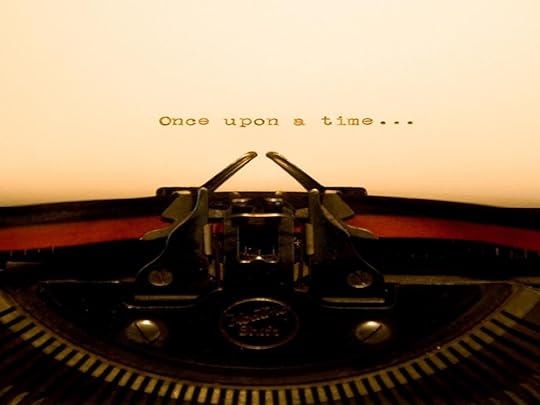
There’s always this old fall-back …
At first, I felt as though I was out of options (that’s probably actually never true in writing). And I felt a little sad that the opening line was causing me so much trouble, because opening lines used to come so naturally to me. In fact, they used to be the first glimpse of a story I would get. That hasn’t been my experience for several years … I think because I’ve tinkered with so many openings professionally, and read so much about the supreme importance of opening lines, that I no longer trust my first instinct for them. And now it seems that instinct has deserted me altogether.
This is a problem, since not having an opening line makes, well, opening a story daunting. I started with a not-so-great opening line for my Rapunzel novel because November had arrived, whether I liked it or not. In revisions, I gave it a better opening line. Now, I’m poised to begin my Dark Crystal novel, but I’m hung up on the opening line again, although my mind is swirling with images for the story itself that continue to come clearer and clearer to me. But without an opening line, I feel as if they’re all locked behind a gate I can’t open.
I know that’s not true. I can climb over the gate. I can bust it open. It may be messy, but at least I’ll be inside, and I can come back and fix it later.
My friend also offered some insight that makes me feel less daunted about the whole opening line conundrum, and which I think is good advice for any writer to follow, especially those who fill their brains with too much writing advice:
“Your opening … might be a victim of overthinking. It might be a problem of you trying to figure out what’s ‘right’ in writing, and not what’s right for your story. I think you need to figure out what the story needs, and not what the writing advice columnists need. Maybe the reason that opening lines had always come naturally to you is because that was before you spoiled your brain with too much writing advice.”
Indeed. Back when openings came easier to me, I was young enough that I felt I had plenty of “time” to become a successful writer. I wanted that, of course, but I didn’t feel like a failure for not having it yet. All I wanted to do was to tell that story, so I never put locks on any of the gates.
After letting it percolate for a bit, I do think I’ve arrived at a better opening for the story my friend read, and the story will be better for it. And I’ll come up with an opening for my Dark Crystal novel, too. I just have to be OK with accepting that it might not happen at the beginning.


September 7, 2013
A Year in the Life, Week 19: Before and After
Yesterday’s A Year in the Life exercise was to write about a “before and after” experience. I wrote about getting married, which is the most recent dividing line in my life.
Before I got married, I thought a part of myself would become lost, that I would be swallowed up by being “wife” and would stop being Lacey. I also feared that I would get tired of Ivan. We were in a long-distance relationship and the most time we ever spent together was 5 days straight. I pictured near-constant resentment about undone chores, afraid our house would look like Ivan’s neglected apartment. One night while we were engaged, we lay in the darkness of Ivan’s bedroom and asked each other what we feared most about marriage.
Ivan said, “That I’ll do something to hurt you. I don’t want to, but I’m afraid that I’ll mess up and I will anyway.”
I said, “We will hurt each other. It just depends on what kind of hurt it is, and how we work through it.”
I told him that what I feared most about marriage was always having my emotions so close to the surface. Loving him made me feel so vulnerable and raw sometimes, kept breaking through the walls I could keep intact with everyone else in my life. I was afraid living with him every day would leave me feeling perpetually raw, my emotions always too close to the surface, so that a forgotten commitment or a hurtful remark would cut me to the core … and I’d have nowhere to run to, nowhere to hide, because he would always be there.
As much as I loved him, I loved my life as a single person, too. I loved the freedom, to do whatever I wanted, but also from romantic entanglement, or entanglement of my emotions, period. At the end of the day, I could always retreat to be just with myself, and I didn’t know how I’d cope with periods of emotional upheaval without that.
While we were long-distance, I still maintained a semblance of being single in our time apart. Not that I flirted with other people or thought of myself as single, but for those few days a week I was still essentially the center of my own world, with no one I had to answer to.
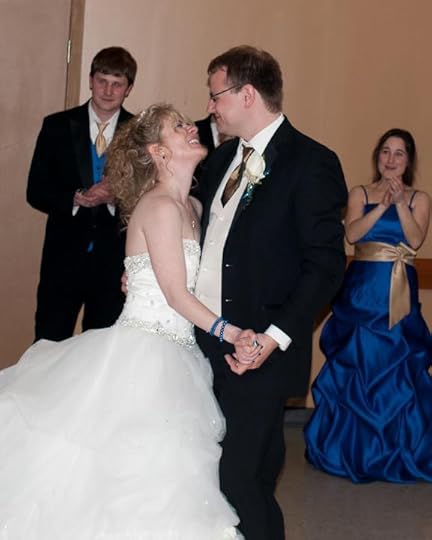
The day that divided before and after.
After being married, I realize that a lot of that fractured and raw feeling came from how unnatural it was to maintain a life separate from and beside my beloved simultaneously. Rather than cope by retreating, I have to be honest with myself and with Ivan when I’m upset and vulnerable–I can’t hide from him or myself, and so I’ve been forced to realize that that never was the optimum way to deal with stress. I also didn’t account for the fact that marriage would make our relationship more secure, as all the masks fall away one by one and we’re still both here. I didn’t account for how much more I would love him for spending every day together, and that with that love would come additional safety that I once thought I could only find within myself. There have been difficult moments, but in the midst of them, there’s been a sort of beauty, too, the recognition that those moments of pain remind us both how human and imperfect we are, and that what we’re living here is something real, not some romantic fantasy. And I see in those experiences a further refining of my own soul and our relationship.
I don’t feel that marriage has taken a part of myself from me, or that I’m no longer the same person, but that now I have a new context in which to learn about who I am, in which to deepen my spirit. There are times when I subvert what I want for what’s best for “us”–but rather than resent it, I remind myself that it’s worth putting the needs of our marriage first, that this has brought me so much good that I want to do what I can to keep it in my life.
Rather than losing part of myself, I feel more whole.
I thought marriage would make us take each other for granted, that the intensity of our feelings was related to the fact that we couldn’t be around each other every day. Instead, being with Ivan every day has only driven home how much I want to be with him. I look forward to his kiss welcoming me home, and I still stop what I’m doing to connect with him when he comes home. We still lead our own lives and spend much of our days apart–for me, as an introvert, he’s become even more precious to me. For there’s nothing I love more than being home, and now he is home to me.
Marriage has allowed me to face many of my fears and realize that they loomed larger in my mind than in reality. So many people go into marriage with this romanticized idea and then find themselves disillusioned by the reality; I went into it with a lot of doom and gloom fear and found the reality of it to be sweeter than I could have imagined. Sometimes, I even feel like perhaps we’re doing something wrong because being married just seems so easy. But really, it’s because I did something so right by accepting Ivan as my partner on this journey, with his optimism and his patience and humor and warm, strong hands. I knew these things about him before we married, which is why I said yes. But I couldn’t fully appreciate the depths of these gifts until after.
—
[I didn't write this as part of my initial response to the exercise, but I was also thinking about how there's a certain level of freedom that comes from being married. When I was single, although I was free to imagine thousands of outcomes for my life and act on any of them, there was always this part of me that worried and wondered about whether I would ever find "someone." My radar was up when I was in social settings; I felt the need to constantly be "ready" or "on alert," and then disappointed when I felt I'd let a good chance "go by." I never realized how draining all that not knowing was until it was gone from my life. Now that Ivan's here, I can truly focus on the rest of my life, and feel a sense of stability as I go forth. And stability brings a whole new, wonderful sort of freedom.]



